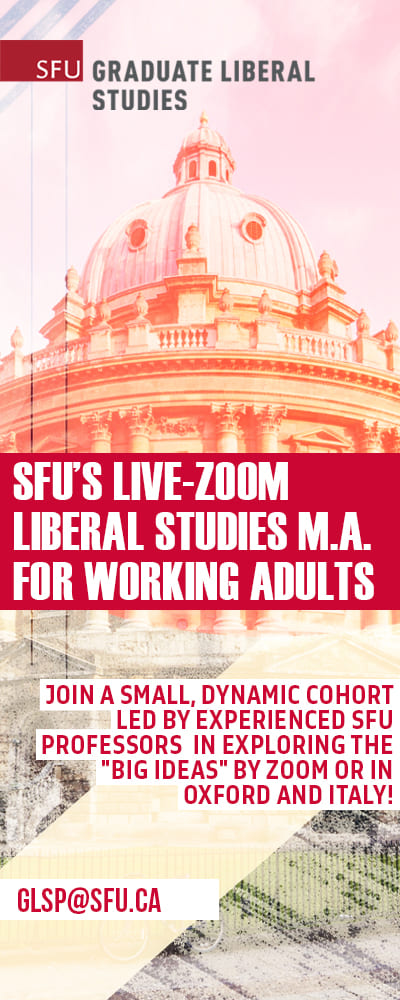1132 Vancouver for professionals
Vancouver for Beginners
by Alex Leslie
Toronto: Book*hug Press, 2019
$18.00 / 9781771665346
Reviewed by Jessica Poon
*
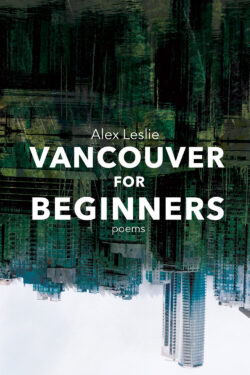 It’s easier to think of Vancouver as paradise when you don’t live there. I spoke to a Californian today on the phone who positively rhapsodized about Vancouver being a world-class city. “I’ve visited nineteen times,” he said, eager to prove his enthusiasm credentials. This Californian evinced a preference for Victoria over Vancouver. “There’s just . . . more harmony. It’s like Switzerland.” I thought about Swiss prisons — pretty nice, as far as prisons go, which I mentioned — and I thought about Victoria, i.e., the capital city of British Columbia. I wasn’t sure it was a fair comparison for either place.
It’s easier to think of Vancouver as paradise when you don’t live there. I spoke to a Californian today on the phone who positively rhapsodized about Vancouver being a world-class city. “I’ve visited nineteen times,” he said, eager to prove his enthusiasm credentials. This Californian evinced a preference for Victoria over Vancouver. “There’s just . . . more harmony. It’s like Switzerland.” I thought about Swiss prisons — pretty nice, as far as prisons go, which I mentioned — and I thought about Victoria, i.e., the capital city of British Columbia. I wasn’t sure it was a fair comparison for either place.
“Of course, it’s not perfect,” the Californian conceded, perhaps sensing that I was on the cusp of saying something about fentanyl, unaffordable housing, the sixties scoop, anti-Asian racism — take your pick — and, you know, the quasi-impossibility of lemon trees. He probably thought I was a white person over the phone, which, to be fair, is something I used to think about myself, too. “You’re lucky to live there,” he said. “Don’t lose your joie de vivre.”
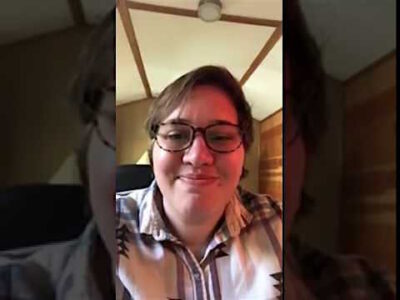
Reading Vancouver for Beginners by Alex Leslie was, in a way, like paying attention to a panhandler you would normally ignore. There’s a part of me that is inclined to reply to the greeting and solicitation of money that a panhandler addresses to me—the part concerned with assessing myself as ultimately decent. Doing the bare minimum to feel decent, of course, is not the same thing as actually being decent. And yet, my salutation doesn’t put food in their bellies. “As long as you have your phone, you have dinner,” a woman in Chinatown said to me after asking me for change. I didn’t have spare change — metonymy for coins — and I didn’t change her life in any meaningful way, either.
I wasn’t sure if the correct inference was that a phone — precious non-renewable resources depleted, ostensibly to enable connection — was edible, or that having a phone was an indicator of socioeconomic wealth. And yet, when you ignore a panhandler in your busy, busy day, don’t you become a little less human? And not in a good way, either.
I was born in Vancouver and for an embarrassingly lengthy part of my life, I never understood all the fuss about Vancouver. Why would I? I took it for granted. Trees? I’m not some arboreal person foraging for mushrooms or going on hikes. I like being indoors, away from people. I find al fresco dining appallingly overrated — I don’t like heat; I don’t like flies; I don’t like the forced cheeriness. (Yes, I miss indoor dining in the time of Covid). I’m not a forest bather; I’m happiest in a room with a calibrated Goldilocks temperature. I embrace sitting the fuck down with a book, away from nature. I can’t stand memoirs that have epiphanies involving nature. Despite being borderline anti-nature, I’m twenty-seven now, and I’m starting to see what the fuss about Vancouver is all about. As the Californian admitted, it’s not perfect.
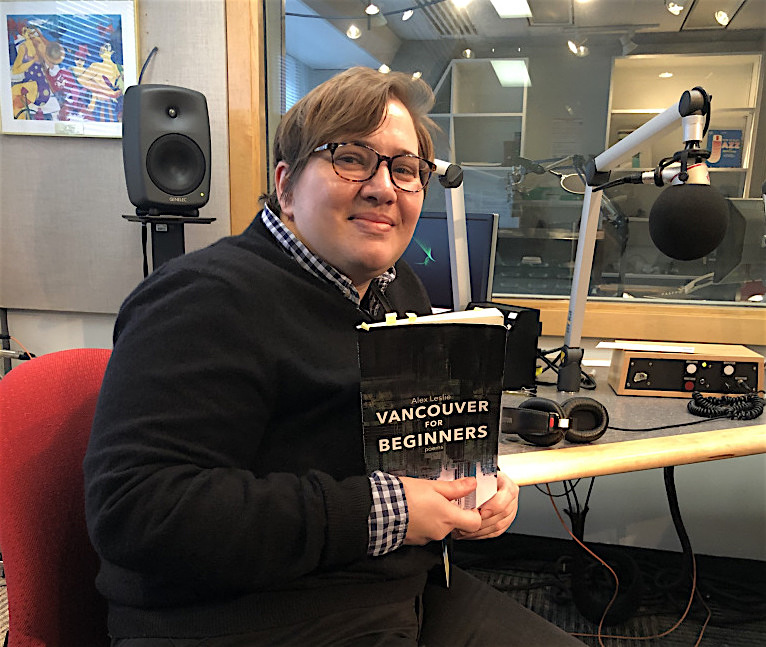
Alex Leslie’s volume of poetry inspired me to write a poem. I’m not much of a poet. I think a real poet would shudder, and not with delight. I wanted to look away, but I kept on reading, and I was inspired. Vancouver is good for many things: sushi joints more numerous than Tokyo; destination hikes; vegan pizza; bike routes. But it’s not perfect. It’s not like Switzerland or Victoria. Maybe I sound like a caricature of a broken record. If you want to see a pockmarked Vancouver and you like strong images and a voice that doesn’t give a fig about being ingratiating, Vancouver for Beginners is the book for you.
*
When I explain I am a lifelong Vancouverite,
there is an asterisk*
*I am really saying that I am a settler who was born in Vancouver.
Youth is relative;
it is not ahistorical.
Perhaps we are all beginners in Vancouver.
What would Vancouver for pros even mean?
Vancouver for prose.
Vancouver Murphy’s law:
If you don’t have an umbrella, it will rain.
Vancouver opens its mouth and words come out.
When you drink from the river, you forget (p. 12).
What does it mean to be a lifelong Vancouverite and a settler on unceded territory?
For me, no land acknowledgment can ever be enough.
Where Douglas Coupland sees “charmless concrete dumps” —
and he’s not entirely wrong —
I see practicality and affordability for immigrants
A time-lapse photograph shows the block you grew up on morphed into Vancouver Specials, creatures shedding their skins and emerging chests exploded into golems, holding their distended stomachs, faces pebbled with sweat and stucco.
Pugs: so ugly they’re considered cute —
are Vancouver specials like that?
Pretty sure these houses could be sold for more than a million dollars, now.
There are entire neighbourhoods you need to forgive.
… You can cut your ties with stories but not with certain bus stops (p. 49).
Your first teenaged lover waits for weeks before writing back:
If you think you hate Vancouver, you probably just hate yourself (p. 49).
People are always in a hurry to tell strangers
how impossible it is to make friends in Vancouver.
People are in a hurry to agree.
They do not become friends, however.
I used to have a habit of asking people who had specifically moved to Vancouver, i.e., sought it out, why. I wasn’t trying to be nosy or petulant, although I probably sounded like it. I was born here; I lived here; I didn’t give a second fig or fiddle about nature, ostensibly the greatest draw. Why were people coming here in droves? Was it just because they came from Alberta? Or because they didn’t know any better?
As time passes, the familiarity becomes more appreciative than contemptuous.
Can I be a tourist where I am a privileged citizen?
My eyes, myopic to the point of legal blindness — a great excuse to never drive — are now, finally, able to appreciate what it is that people upend their lives to experience. What I take for granted; their triumphant struggle (if they’re lucky). Yes, there is beauty. Lots of it. I’m not even talking about the trees. But is it unique? That, I am less certain. Are there scars that cannot be — and should not be — rendered invisible? Also, yes. At least once, a man I did not know, i.e., a stranger, yelled that I was a cunt. He may have had his reasons; I do not know them. I cannot honestly say there was anything personal about it — I could have been anyone — and there was nothing specifically Vancouver about it. But: I do associate it with Hastings.
Not long ago, a man, more to himself than anyone else, sitting down in front of The Bay — refusing to call it Hudson’s Bay is my way of proving I am a real Vancouverite, whatever that means; the same way I will insist on calling International Village “Tinseltown,” a marker that I know Vancouver’s past when in actuality, like Jon Snow, I know nothing; I cannot tell you what a peninsula is; I cannot tell you what a delta is — said, “Where have all the white people gone?”
A friend’s father told me — with full knowledge of my Chinese descent, involuntary thing that it is — about how Chinese people were buying up properties without occupying them. They were rich. They were amoral.
Am I just a middle-class anomaly?
But nobody is actually middle-class.
For my birthday, a friend gave me
a gift certificate to the float house
that opened not long ago on Water
Street, where the detoxes and shelters
Fight luxury condos for space.
“Something you’d never buy for
Yourself,” she said, smiling proudly,
a person doing a good deed. She’d
gone several times, she told me,
each a “mystical” experience. As
soon as she said “mystical,” my mind
began to generate excuses. I lost the
gift certificate, was prone to minor
seizures, was pregnant! The float
house was where she went to really
let go, she told me (p. 87).
I have a friend who used to do the Keto diet. I decided to let it go, on account of this friend having a truly adorable Pomsky and also not wanting to get into a sermon about orthorexia and fad diets and fatphobia. Being right doesn’t usually move mountains; it doesn’t even usually change minds.
My sermons move nobody.
At best, they provoke the kind of silence that indicate my audience is too polite to vocally express that they disagree and wish I’d never spoken.
If something is life-changing, I don’t want to hear about it.
I don’t take recommendations, almost as a rule. Some exceptions.
But: I do give unsolicited recommendations. Baldly, brashly.
And I do recommend Alex Leslie’s volume of poetry: heartily.
*
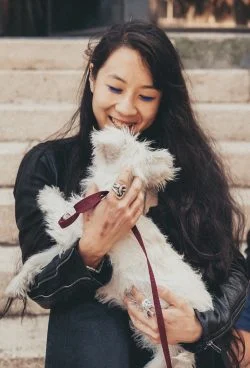
Jessica Poon, a writer, line cook, and pianist in Vancouver, is also now an MFA candidate in Creative Writing at the University of Guelph. Editor’s note: Jessica Poon has also reviewed books by Zsuzsi Gartner, Robyn Harding, Brad Hill & Chris Dagenais, Lindsay Wong, Emily St. John Mandel, Sheung-King, Eve Lazarus, Annabel Lyon, Monika Hibbs, Grant Hayter-Menzies, and Wayson Choy for The Ormsby Review. Visit her website here.
*
The Ormsby Review. More Books. More Reviews. More Often.
Publisher and Editor: Richard Mackie
The Ormsby Review is a journal service for in-depth coverage of B.C. books and authors. The Advisory Board consists of Jean Barman, Wade Davis, Robin Fisher, Cole Harris, Hugh Johnston, Patricia Roy, David Stouck, Maria Tippett, and Graeme Wynn. Scholarly Patron: SFU Graduate Liberal Studies. Honorary Patron: Yosef Wosk. Provincial Government Patron since September 2018: Creative BC
“Only connect.” – E.M. Forster






